9 start with L start with L
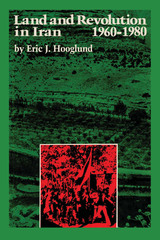
Carried out by the government of the shah between 1962 and 1971, the Iranian land reform was one of the most ambitious such undertakings in modern Middle Eastern history. Yet, beneath apparent statistical success, the actual accomplishments of the program, in terms of positive benefits for the peasantry, were negligible. Later, the resulting widespread discontent of thousands of Iranian villagers would contribute to the shah's downfall.
In the first major study of the effects of this widely publicized program, Eric Hooglund's analysis demonstrates that the primary motives behind the land reform were political. Attempting to supplant the near-absolute authority of the landlord class over the countryside, the central government hoped to extend its own authority throughout rural Iran. While the Pahlavi government accomplished this goal, its failure to implement effective structural reform proved to be a long-term liability.
Hooglund, who conducted field research in rural Iran throughout the 1970s and who witnessed the unfolding of the revolution from a small village, provides a careful description of the development of the land reform and of its effects on the main groups involved: landlords, peasants, local officials, merchants, and brokers. He shows how the continuing poverty in the countryside forced the migration of thousands of peasants to the cities, resulting in serious shortages of agricultural workers and an oversupply of unskilled urban labor. When the shah's government was faced with mass opposition in the cities in 1978, not only did a disillusioned rural population fail to support the regime, but thousands of villagers participated in the protests that hastened the collapse of the monarchy.
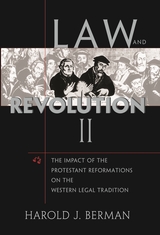
Harold Berman’s masterwork narrates the interaction of evolution and revolution in the development of Western law. This new volume explores two successive transformations of the Western legal tradition under the impact of the sixteenth-century German Reformation and the seventeenth-century English Revolution, with particular emphasis on Lutheran and Calvinist influences. Berman examines the far-reaching consequences of these apocalyptic political and social upheavals on the systems of legal philosophy, legal science, criminal law, civil and economic law, and social law in Germany and England and throughout Europe as a whole.
Berman challenges both conventional approaches to legal history, which have neglected the religious foundations of Western legal systems, and standard social theory, which has paid insufficient attention to the communitarian dimensions of early modern economic law, including corporation law and social welfare.
Clearly written and cogently argued, this long-awaited, magisterial work is a major contribution to an understanding of the relationship of law to Western belief systems.
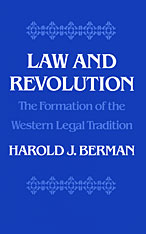
The roots of modern Western legal institutions and concepts go back nine centuries to the Papal Revolution, when the Western church established its political and legal unity and its independence from emperors, kings, and feudal lords. Out of this upheaval came the Western idea of integrated legal systems consciously developed over generations and centuries. Harold J. Berman describes the main features of these systems of law, including the canon law of the church, the royal law of the major kingdoms, the urban law of the newly emerging cities, feudal law, manorial law, and mercantile law. In the coexistence and competition of these systems he finds an important source of the Western belief in the supremacy of law.
Written simply and dramatically, carrying a wealth of detail for the scholar but also a fascinating story for the layman, the book grapples with wide-ranging questions of our heritage and our future. One of its main themes is the interaction between the Western belief in legal evolution and the periodic outbreak of apocalyptic revolutionary upheavals.
Berman challenges conventional nationalist approaches to legal history, which have neglected the common foundations of all Western legal systems. He also questions conventional social theory, which has paid insufficient attention to the origin of modern Western legal systems and has therefore misjudged the nature of the crisis of the legal tradition in the twentieth century.
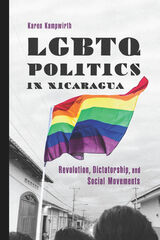
Karen Kampwirth is a renowned scholar of the Nicaraguan Revolution, who has been writing at the intersection of gender and politics for decades. In this chronological telling of the last fifty years of political history in Nicaragua, Kampwirth deploys a critical new lens: understanding politics from the perspective of the country’s LGBTQ community. Kampwirth details the gay and lesbian guerrillas in the 1960s and 1970s, Nicaragua’s first openly gay television wizard in the 1980s, and the attempts by LGBTQ revolutionaries to create a civil rights movement and the subsequent squashing of that movement by the ruling Sandinista party. She analyzes the shifting political alliances, the rise of strong feminist and LGBTQ movements in Nicaragua, and the attempts by the administration of Daniel Ortega to co-opt and control these movements.
Ultimately, this is a story of struggle and defeat, progress and joy. This timely book provides a well-documented review of LGBTQ politics in modern Nicaragua, helping us to see the Sandinista Revolution and its ongoing aftermath in a new light.
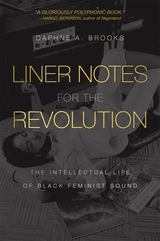
Winner of the Ralph J. Gleason Music Book Award, Rock & Roll Hall of Fame
Winner of the American Book Award, Before Columbus Foundation
Winner of the PEN Oakland–Josephine Miles Award
Winner of the MAAH Stone Book Award
A Pitchfork Best Music Book of the Year
A Rolling Stone Best Music Book of the Year
“Brooks traces all kinds of lines, finding unexpected points of connection…inviting voices to talk to one another, seeing what different perspectives can offer, opening up new ways of looking and listening by tracing lineages and calling for more space.”
—New York Times
An award-winning Black feminist music critic takes us on an epic journey through radical sound from Bessie Smith to Beyoncé.
Daphne A. Brooks explores more than a century of music archives to examine the critics, collectors, and listeners who have determined perceptions of Black women on stage and in the recording studio. How is it possible, she asks, that iconic artists such as Aretha Franklin and Beyoncé exist simultaneously at the center and on the fringe of the culture industry?
Liner Notes for the Revolution offers a startling new perspective on these acclaimed figures—a perspective informed by the overlooked contributions of other Black women concerned with the work of their musical peers. Zora Neale Hurston appears as a sound archivist and a performer, Lorraine Hansberry as a queer Black feminist critic of modern culture, and Pauline Hopkins as America’s first Black female cultural commentator. Brooks tackles the complicated racial politics of blues music recording, song collecting, and rock and roll criticism. She makes lyrical forays into the blues pioneers Bessie Smith and Mamie Smith, as well as fans who became critics, like the record-label entrepreneur and writer Rosetta Reitz. In the twenty-first century, pop superstar Janelle Monae’s liner notes are recognized for their innovations, while celebrated singers Cécile McLorin Salvant, Rhiannon Giddens, and Valerie June take their place as cultural historians.
With an innovative perspective on the story of Black women in popular music—and who should rightly tell it—Liner Notes for the Revolution pioneers a long overdue recognition and celebration of Black women musicians as radical intellectuals.

Winner of the Ralph J. Gleason Music Book Award, Rock & Roll Hall of Fame
Winner of the American Book Award, Before Columbus Foundation
Winner of the PEN Oakland–Josephine Miles Award
Winner of the MAAH Stone Book Award
A Pitchfork Best Music Book of the Year
A Rolling Stone Best Music Book of the Year
A Boston Globe Summer Read
“Brooks traces all kinds of lines…inviting voices to talk to one another, seeing what different perspectives can offer, opening up new ways of looking and listening.”
—New York Times
“A wide-ranging study of Black female artists, from elders like Bessie Smith and Ethel Waters to Beyoncé and Janelle Monáe…Connecting the sonic worlds of Black female mythmakers and truth-tellers.”
—Rolling Stone
“A gloriously polyphonic book.”
—Margo Jefferson, author of Negroland
How is it possible that iconic artists like Aretha Franklin and Beyoncé can be both at the center and on the fringe of the culture industry? Daphne Brooks explores more than a century of music archives to bring to life the critics, collectors, and listeners who have shaped our perceptions of Black women both on stage and in the recording studio.
Liner Notes for the Revolution offers a startling new perspective, informed by the overlooked contributions of other Black women artists. We discover Zora Neale Hurston as a sound archivist and performer, Lorraine Hansberry as a queer feminist critic of modern culture, and Pauline Hopkins as America’s first Black female cultural commentator. Brooks tackles the complicated racial politics of blues music recording, song collecting, and rock and roll criticism in this long overdue celebration of Black women musicians as radical intellectuals.
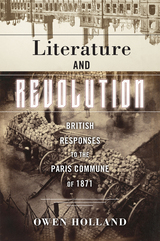
This book examines how a heterogeneous group of authors in Britain responded to the Commune. In doing so, it provides the first full-length critical study of the reception and representation of the Commune in Britain during the closing decades of the nineteenth century, showing how discussions of the Commune functioned as a screen to project hope and fear, serving as a warning for some and an example to others. Writers considered in the book include John Ruskin, Edward Bulwer-Lytton, Eliza Lynn Linton, Mary Elizabeth Braddon, Anne Thackeray Ritchie, Margaret Oliphant, George Gissing, Henry James, William Morris, Alfred Austin and H.G. Wells. As the book shows, many, but not all, of these writers responded to the Commune with literary strategies that sought to stabilize bourgeois subjectivity in the wake of the traumatic shock of a revolutionary event. The book extends critical understanding of the Commune’s cultural afterlives and explores the relationship between literature and revolution.
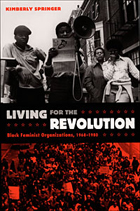
The organizations that Springer examines were the first to explicitly use feminist theory to further the work of previous black women’s organizations. As she describes, they emerged in response to marginalization in the civil rights and women’s movements, stereotyping in popular culture, and misrepresentation in public policy. Springer compares the organizations’ ideologies, goals, activities, memberships, leadership styles, finances, and communication strategies. Reflecting on the conflicts, lack of resources, and burnout that led to the demise of these groups, she considers the future of black feminist organizing, particularly at the national level. Living for the Revolution is an essential reference: it provides the history of a movement that influenced black feminist theory and civil rights activism for decades to come.
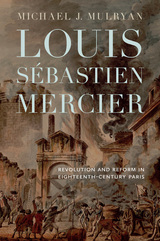
READERS
Browse our collection.
PUBLISHERS
See BiblioVault's publisher services.
STUDENT SERVICES
Files for college accessibility offices.
UChicago Accessibility Resources
home | accessibility | search | about | contact us
BiblioVault ® 2001 - 2024
The University of Chicago Press









